
Richard Charles Rodgers was an American composer who worked primarily in musical theater. With 43 Broadway musicals and over 900 songs to his credit, Rodgers was one of the most well-known American composers of the 20th century, and his compositions had a significant influence on popular music.

Rodgers and Hammerstein was a theater-writing team of composer Richard Rodgers (1902–1979) and lyricist-dramatist Oscar Hammerstein II (1895–1960), who together created a series of innovative and influential American musicals. Their musical theater writing partnership has been called the greatest of the 20th century.

The Jiajing Emperor, also known by his temple name as the Emperor Shizong of Ming (明世宗), personal name Zhu Houcong (朱厚熜), was the 12th emperor of the Ming dynasty, reigning from 1521 to 1567. He succeeded his cousin, the Zhengde Emperor. "Jiajing", the era name of his reign, means "admirable tranquility".
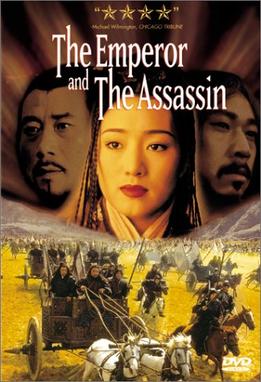
The Emperor and the Assassin, also known as The First Emperor, is a 1998–1999 Chinese historical romance film based primarily on Jing Ke's assassination attempt on the King of Qin, as described in Sima Qian's Records of the Grand Historian. The film was directed by Chen Kaige and stars Gong Li, Zhang Fengyi, Li Xuejian, and Zhou Xun. The film was well received critically and won the Technical Prize at the 1999 Cannes Film Festival. It was the most expensive Chinese film made up to that time, costing US$20 million.
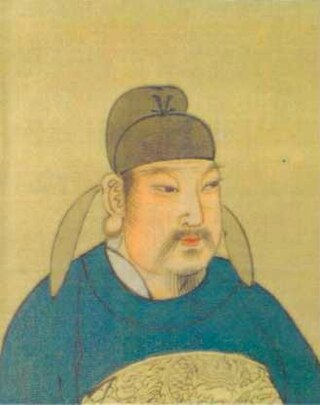
Emperor Xuanzong of Tang was an emperor of China's Tang dynasty, reigning from 25 April 846 until his death. Personally named Li Yi, later renamed Li Chen, and known before his reign as the Prince of Guang, he was considered the last capable emperor of Tang China. Succeeding emperors after Xuanzong would either be too young or be dominated by eunuchs or warlords. Emperor Xuanzong was the 13th son of Emperor Xianzong and an uncle of the previous three emperors, Emperor Jingzong, Emperor Wenzong, and Emperor Wuzong.
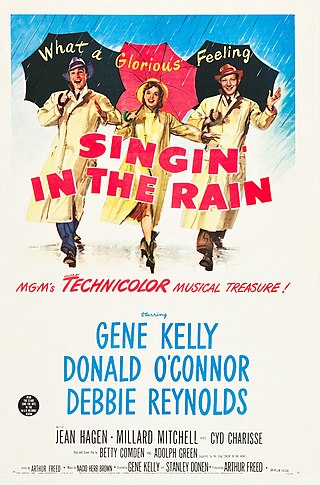
Singin' in the Rain is a 1952 American musical romantic comedy film directed and choreographed by Gene Kelly and Stanley Donen, starring Kelly, Donald O'Connor, and Debbie Reynolds and featuring Jean Hagen, Millard Mitchell and Cyd Charisse. It offers a lighthearted depiction of Hollywood in the late 1920s, with the three stars portraying performers caught up in the transition from silent films to "talkies".

Emperor Daizong of Tang, personal name Li Yu, né Li Chu, was an emperor of the Chinese Tang dynasty.

Emperor Yizong of Tang, né Li Wen, later changed to Li Cui, was an emperor of the Tang dynasty of China. He reigned from 859 to 873. Emperor Yizong was the eldest son of Emperor Xuanzong. After Emperor Xuanzong's death in 859, Emperor Yizong was placed on the throne by the eunuch Wang Zongshi (王宗實), who killed other eunuchs supporting another son of Emperor Xuanzong, Li Zi the Prince of Kui.

Emperor Wenzong of Tang (809–840), personal name Li Ang, né Li Han (李涵), was an emperor of the Tang dynasty of China. He reigned from 827 to 840. Emperor Wenzong was the second son of Emperor Muzong and younger brother of Emperor Jingzong. A rare occurrence in Chinese history, Emperor Wenzong, along with his elder brother Emperor Jingzong and younger brother Emperor Wuzong, reigned in succession.
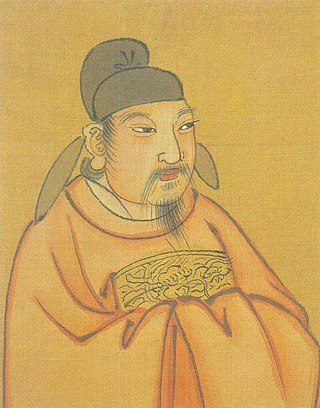
Emperor Xianzong of Tang, personal name Li Chun, né Li Chun (李淳), was an emperor of the Chinese Tang dynasty. He was the eldest son of Emperor Shunzong, who reigned for less than a year in 805 and who yielded the throne to him late that year.
Emperor Shunzong of Tang, personal name Li Song, was an emperor of the Chinese Tang dynasty. He was created crown prince in 779 and became emperor in 805 after the death of his father Emperor Dezong, of whom he was the oldest son. His reign lasted less than a year, as, due to his illness, the powerful eunuchs were able to get him to approve a transfer of the throne to his son Li Chun. Emperor Shunzong was honored with the title of Taishang Huang. He died in 806, with some later historians suspecting that he was murdered by the eunuchs who arranged for Emperor Xianzong's succession.

By Jupiter is a musical with a book by Lorenz Hart and Richard Rodgers, music by Rodgers, and lyrics by Hart. The musical is based on the play The Warrior's Husband by Julian F. Thompson, set in the land of the Amazons. By Jupiter premiered on Broadway in 1942 and starred Ray Bolger, and was the last musical written by Rodgers and Hart; when Hart’s erratic behavior was often the cause of friction between him and Rodgers and led to a breakup of their partnership the following year before his death. Rodgers then began collaborating with Oscar Hammerstein II.
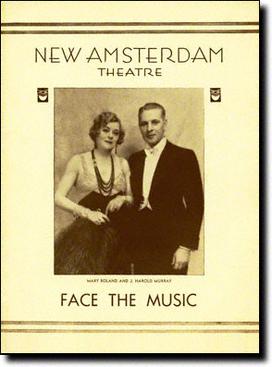
Face the Music is a musical, the first collaboration between Moss Hart (book) and Irving Berlin. Face the Music opened on Broadway in 1932, and has had several subsequent regional and New York stagings. The popular song "Let's Have Another Cup of Coffee" was introduced in the musical by J. Harold Murray.
"Oh, So Nice!" is a song composed by George Gershwin, with lyrics by Ira Gershwin.
Rex is a musical with music by Richard Rodgers, lyrics by Sheldon Harnick and libretto by Sherman Yellen, based on the life of King Henry VIII. The original production starred Nicol Williamson.
Wang Shuwen was a Chinese economist and politician during the Tang dynasty. He was a close associate of Emperor Shunzong while Li Song was crown prince under his father, Emperor Dezong, and was powerful during Emperor Shunzong's brief reign in 805, when Shunzong was severely ill. However, he offended the powerful eunuchs and further lost power when he was forced to leave governmental service due to his mother's death, and after Emperor Shunzong yielded the throne to his son Xianzong, Wang was ordered to commit suicide.
Zheng Yin (鄭絪), courtesy name Wenming (文明), was a Chinese historian and politician during the Tang dynasty, serving as a chancellor during the reign of Emperor Xianzong.
42nd Street Moon is a professional theatre company in San Francisco, California. The company specializes in the preservation and presentation of early and lesser-known works by Rodgers & Hammerstein, Rodgers & Hart, Cole Porter, Irving Berlin, Kurt Weill, George and Ira Gershwin, Jerome Kern, Jerry Bock, Sheldon Harnick, Kander and Ebb, Jule Styne and Comden and Green. In recent years, the company has branched out to include more contemporary works that continue the spirit of the classic American Musical.

The Confidant is a Hong Kong biographical fiction television drama produced by TVB under executive producer Marco Law, and stars Michelle Yim as Empress Dowager Cixi, and Wayne Lai as imperial eunuch Li Lianying. The drama depicts how a group of eunuchs survive in the weakening Qing empire, and closely traces Li's early life from the first day he entered the imperial palace to becoming one of the most powerful political figures in the latter years of the Qing Dynasty. The drama also follows Li's relationship with Cixi, and how he eventually becomes her closest confidant.
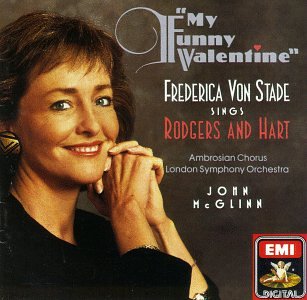
My Funny Valentine: Frederica von Stade sings Rodgers and Hart is a 69-minute studio album of songs from Richard Rodgers and Lorenz Hart's musicals, performed in historically authentic versions by von Stade, Rosemary Ashe, Peta Bartlett, Lynda Richardson, the Ambrosian Chorus and the London Symphony Orchestra under the direction of John McGlinn. It was released in 1990.














